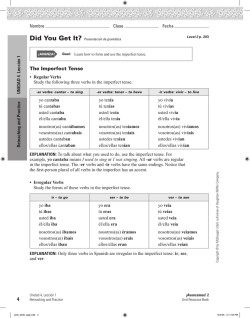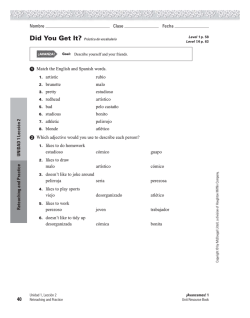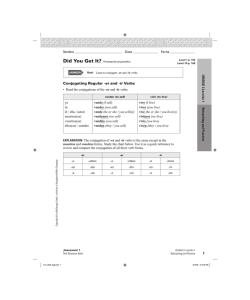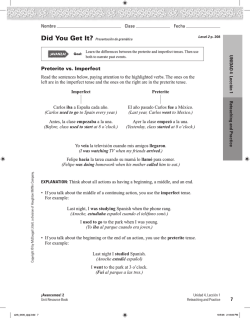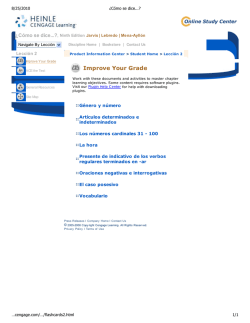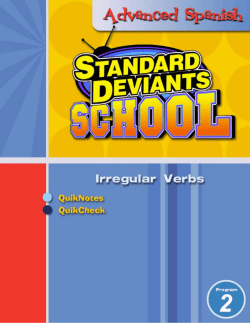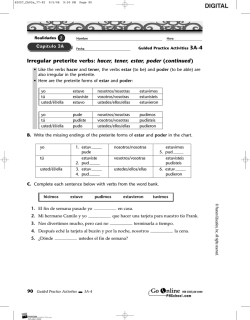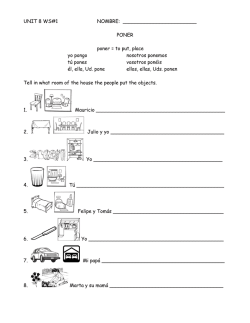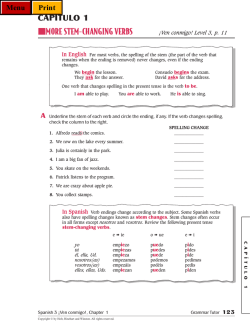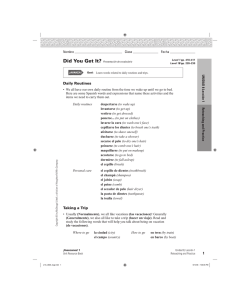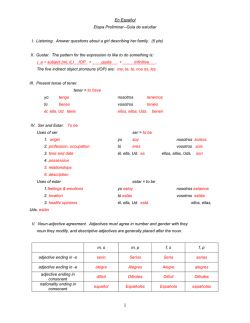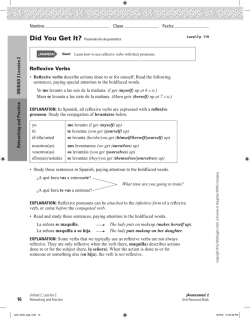
Did You Get It?
Nombre Clase ¡AVANZA! Goal: Level 2 p. 203 Presentación de gramática Learn how to form and use the imperfect tense. The Imperfect Tense • Regular Verbs Study the following three verbs in the imperfect tense. -ar verbs: cantar – to sing Reteaching and Practice UNIDAD 4 Lección 1 Did You Get It? Fecha -er verbs: tener – to have -ir verbs: vivir – to live yo cantaba tú cantabas usted cantaba él/ella cantaba yo tenía tú tenías usted tenía él/ella tenía yo vivía tú vivías usted vivía él/ella vivía nosotros(as) cantábamos vosostros(as) cantabais ustedes cantaban ellos/ellas cantaban nosotros(as) teníamos vosotros(as) teníais ustedes tenían ellos/ellas tenían nosotros(as) vivíamos vosotros(as) vivíais ustedes vivían ellos/ellas vivían example, yo cantaba means I used to sing or I was singing. All -ar verbs are regular in the imperfect tense. The -er verbs and -ir verbs have the same endings. Notice that the first-person plural of all verbs in the imperfect has an accent. • Irregular Verbs Study the forms of these verbs in the imperfect tense. ir – to go ser – to be ver – to see yo iba tú ibas usted iba él/ella iba yo era tú eras usted era él/ella era yo veía tú veías usted veía él/ella veía nosotros(as) íbamos vosostros(as) ibais ellos/ellas iban nosotros(as) éramos vosostros(as) erais ellos/ellas eran nosotros(as) veíamos vosostros(as) veíais ellos/ellas veían EXPLANATION: Only three verbs in Spanish are irregular in the imperfect tense: ir, ser, and ver. 4 Unidad 4, Lección 1 Reteaching and Practice s2rb_0400_dygi.indd 4 Copyright © by McDougal Littell, a division of Houghton Mifflin Company. EXPLANATION: To talk about what you used to do, use the imperfect tense. For ¡Avancemos! 2 Unit Resource Book 10/5/06 2:17:43 PM Nombre Clase Did You Get It? Goal: Level 2 pp. 204–205 Práctica de gramática Learn how to form and use the imperfect tense. UNIDAD 4 Lección 1 ¡AVANZA! Fecha 1 Write the correct form of each regular verb in the imperfect tense. (estar) 1. yo 2. ellos 3. él 4. nosotros 5. Anita 6. tú 7. los chicos 8. ustedes 9. vosotros (escribir) (hacer) Reteaching and Practice 10. (cantar) (salir) (tener) Rodrigo y yo (estudiar) (jugar) (comer) (vivir) 2 Write the correct form of the boldfaced verb in the imperfect tense based on the Copyright © by McDougal Littell, a division of Houghton Mifflin Company. subject. 1. 2. 3. Vemos a los chicos. a. yo d. mi amigo y yo b. él e. ellos c. vosotras Voy a la tienda. a. tú d. el maestro de francés b. usted e. ustedes c. los amigos Son simpáticos. a. ellas d. tú b. yo e. vosotros c. tus padres ¡Avancemos! 2 Unit Resource Book s2rb_0400_dygi.indd 5 Unidad 4, Lección 1 Reteaching and Practice 5 10/5/06 2:17:49 PM Nombre Clase Fecha 3 Change each verb to the imperfect tense. Follow the model. Reteaching and Practice UNIDAD 4 Lección 1 Modelo: María ve la televisión. María veía la televisión. 1. Roberto juega al fútbol. / Roberto 2. Mi hermana y yo hacemos la tarea. / Mi hermana y yo la tarea. 3. Mis amigos y yo vemos el video. / Mis amigos y yo 4. Pablito y Lucila lloran mucho. / Pablito y Lucila 5. José Antonio es joven. / José Antonio joven. 6. Nosotros vamos al parque. / Nosotros al parque. 7. Ustedes ven el programa. / Ustedes 8. Tú sales mucho. / Tú 9. Yo practico deportes. / Yo 10. al fútbol. el video. mucho. el programa. mucho. deportes. La maestra de español enseña bien. / La maestra de español bien. iba venía trabajaban trabajaba caminábamos era íbamos hacíamos veíamos dormíamos vivía hacía cenábamos jugábamos tenía Te voy a contar cómo mi vida cuando yo 2. quince años y 3. en tu ciudad. Todos los días, yo 4. a la escuela por la mañana. Después de las clases, mi mamá 5. a la escuela y ella y yo 6. hasta su oficina. Allí, mi tía y ella 7. un rato y mi primo y yo 8. la tarea. Por la tarde, mis amigos y yo 9. juntos en el parque o 10. una película en mi casa. Después, todos nosotros 11. y nos 12. antes de las diez. 1. 5 Write a sentence describing two things you used to do when you were young. Cuando yo era niño(a), 6 Unidad 4, Lección 1 Reteaching and Practice s2rb_0400_dygi.indd 6 Copyright © by McDougal Littell, a division of Houghton Mifflin Company. 4 Choose a word from the box to complete Marco’s letter. ¡Avancemos! 2 Unit Resource Book 10/5/06 2:17:55 PM Nombre Clase Fecha Level 2 p. 207 ¿Recuerdas? Weather Expressions UNIDAD 4 Lección 1 • Study the names of the seasons in Spanish. la primavera (spring) el verano (summer) el otoño (fall) el invierno (winter) Reteaching and Practice • Now study the following weather expressions in Spanish. ¿Que tiempo hace? (What is the weather like?) Hace frío. (It is cold.) Hace calor. (It is hot.) Hace sol. (It is sunny.) Llueve. (It is raining.) Hace viento. (It is windy.) Nieva. (It is snowing.) EXPLANATION: All weather expressions take the third-person singular of the verb. These are considered impersonal sentences in Spanish. Práctica 1 Look at the weather expressions above and select one that usually goes with each of the seasons. Copyright © by McDougal Littell, a division of Houghton Mifflin Company. La primavera: El verano: El otoño: El invierno: 2 Now use your own experience to answer these questions about your activities in different types of weather. 1. ¿Qué te gusta hacer cuando hace mucho calor? 2. ¿Qué haces generalmente cuando hace mucho frío? 3. Normalmente, ¿qué tiempo hace en tu ciudad en el mes de julio? 4. ¿Qué te gusta hacer cuando nieva? ¿Adónde te gusta ir? 5. ¿Cuál es tu estación favorita? ¿Por qué? ¡Avancemos! 2 Unit Resource Book s2rb_0400_dygi.indd 11 Unidad 4, Lección 1 Reteaching and Practice 11 10/5/06 2:18:27 PM
© Copyright 2026
